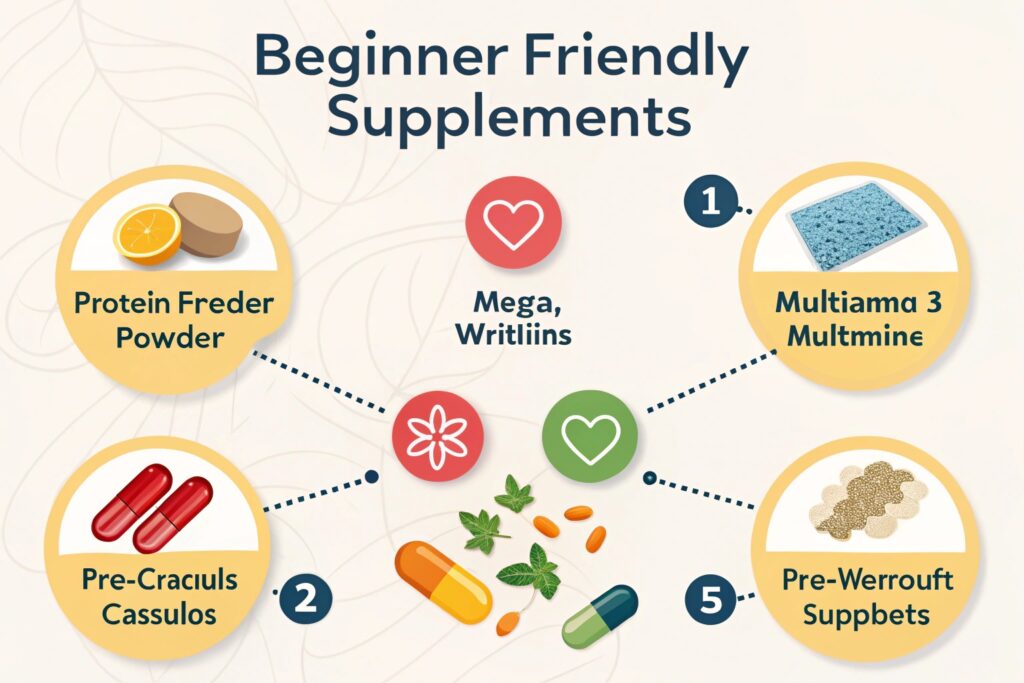Introduction
effective supplements for beginners: If you’re stepping into the world of fitness, the phrase “starter supplements” can feel both exciting and overwhelming. You may wonder whether a protein shake, creatine, or pre‑workout powder will truly accelerate your progress or simply add unnecessary expense. In this guide we’ll cut through the hype and answer the question “Starter Supplements: What (If Anything) Works for Beginners?” with evidence‑based insight, real‑world examples, and a clear action plan. Whether you’re a college student, a busy professional, or anyone newly committed to a healthier lifestyle, the information below will help you decide which (if any) supplements deserve a spot in your routine—while keeping safety, cost, and effectiveness front‑and‑center.
Understanding the Basics: Why Supplements Exist and When They’re Actually Needed
Supplements Are Not Magic Pills
The supplement industry is a $140 billion market in the United States alone, and the sheer volume of products can make it seem like every fitness goal has a dedicated capsule (Statista, 2024). However, the fundamental purpose of a dietary supplement is to fill nutritional gaps, not to replace whole foods or training. For beginners, the biggest “gap” is often protein intake and micronutrient adequacy—both of which can usually be met through balanced meals if you plan wisely. A review published in Nutrients (2022) found that only 30 % of recreational athletes needed protein supplementation because they consistently fell short of the recommended 1.2–1.6 g/kg body weight per day.
The Role of Training Experience
Training experience dramatically influences how much you can benefit from a supplement. A novice who performs three full‑body sessions per week will see the majority of gains from progressive overload, proper technique, and adequate rest. Supplements such as creatine or beta‑alanine become more impactful once you have a solid training foundation and can tolerate a higher training volume. As a certified strength and conditioning specialist (CSCS), I’ve observed that beginners who focus first on consistency—show up, log meals, and recover—outperform those who chase the latest “pump‑boosting” powders.
Core Supplements Worth Considering for True Beginners
1. High‑Quality Whey or Plant‑Based Protein
Protein is the building block of muscle repair, and many beginners underestimate how much they need. If you’re not hitting at least 0.8 g/kg of body weight through food alone, a protein powder can be a convenient way to bridge the shortfall. Whey isolate offers a rapid digestion profile—ideal post‑workout—while pea, rice, or soy blends provide comparable essential amino acid (EAA) profiles for vegans. A 2023 meta‑analysis in Journal of the International Society of Sports Nutrition reported a modest 1–2 kg increase in lean body mass over 12 weeks when protein intake exceeded 1.6 g/kg, regardless of training level. For beginners, simply ensuring you meet the baseline 1.2 g/kg is sufficient, and a scoop of protein after training can achieve that without fuss.
2. Creatine Monohydrate – The Most Researched Ergogenic Aid
Creatine is unique because it has a near‑perfect safety profile (no adverse effects reported in healthy adults at standard 3–5 g/day doses) and a wealth of research behind it. It works by increasing phosphocreatine stores, allowing you to produce more ATP during short, high‑intensity efforts—think sprinting, heavy lifts, or HIIT. Even beginners can see 5–10 % strength gains after 4–6 weeks of consistent dosing (JISSN, 2022). The loading phase (20 g/day for 5 days) isn’t necessary; a simple 3‑gram maintenance dose yields the same benefits over a slightly longer timeline.
Actionable Advice: How to Integrate Starter Supplements Safely and Effectively
Step 1 – Conduct a Quick Nutrient Audit
Before you spend a dime, track your food for three days using a free app like MyFitnessPal or Cronometer. Calculate total protein, calcium, vitamin D, and iron. If protein is <1.0 g/kg, prioritize a protein powder. If your diet is low in dairy, leafy greens, or fortified foods, consider a multivitamin that includes vitamin D3 (800–1,000 IU) and magnesium—both crucial for muscle function.
Step 2 – Start With One Supplement at a Time
Layering supplements can make it hard to tell what’s actually working. Begin with protein (if needed) for the first 4 weeks, monitoring performance and recovery. Add creatine in week 5, continuing the same training program. Keep a simple log: note weight lifted, number of reps, and perceived soreness. Research shows that isolated supplementation makes it easier to assess efficacy and reduces the risk of unnecessary stacking.
Step 3 – Pair Supplements With Lifestyle Foundations
No supplement can compensate for poor sleep, inconsistent training, or chronic stress. Aim for 7–9 hours of quality sleep, stay hydrated (2–3 L water daily), and follow a progressive overload plan (e.g., 5% weekly weight increase). When these pillars are solid, a modest 3‑gram dose of creatine combined with adequate protein will help you translate effort into tangible gains.
Comparisons, Benefits, and Potential Challenges of Popular Beginner Supplements
Protein Powder vs. Whole‑Food Protein
Whole foods provide additional nutrients (fiber, phytonutrients) that powders lack. However, powders shine in convenience and protein density. A 30‑gram whey scoop delivers roughly 120 kcal and 24 g of protein with minimal carbs—ideal post‑workout when you may not feel like cooking. If you prefer whole foods, plan a protein‑rich snack (Greek yogurt, boiled eggs, cottage cheese) within an hour of training; otherwise, the powder is a reliable backup.
Creatine vs. Beta‑Alanine
Both are proven performance enhancers, but their mechanisms differ. Creatine boosts strength and power, whereas beta‑alanine buffers lactic acid, delaying fatigue during muscular endurance efforts lasting 60–240 seconds. For most beginners whose programs consist of moderate‑rep strength work, creatine offers clearer, faster benefits. Beta‑alanine can cause harmless tingling (paresthesia) and typically requires a 2‑gram daily dose for at least 4 weeks before noticeable effects.
Multivitamins – Helpful or Harmful?
A well‑formulated multivitamin can safeguard against micronutrient deficits, especially for individuals on calorie‑restricted diets. However, studies (Harvard T.H. Chan School of Public Health, 2023) show no performance advantage for athletes who already meet daily nutrient recommendations through food. The challenge lies in over‑supplementation; fat‑soluble vitamins (A, D, E, K) can accumulate to toxic levels if taken excessively. Choose a USP‑verified product and stick to the label’s recommended dose.
Practical Solutions: Tools, Tracking, and a Step‑by‑Step Starter Supplement Routine
Tool #1 – Nutrition Tracking Apps
Use MyFitnessPal, Cronometer, or the NIH’s MyPlate app to log daily intake. Set a protein goal based on body weight (e.g., 1.2 g/kg) and let the app flag days you fall short. Most apps also let you record supplement doses, giving a full picture of your nutrition.
Tool #2 – Simple Supplement Log Spreadsheet
Create a Google Sheet with columns for Date, Supplement, Dose, Time (pre/post workout), Training Metrics (weight, reps, RPE). Over 4–6 weeks you’ll see trends—perhaps strength spikes after adding creatine, or recovery improves after protein supplementation.
Step‑by‑Step Starter Routine (Weeks 1‑8)
| Week | Nutrition Focus | Supplement(s) | Timing | Notes |
|---|---|---|---|---|
| 1‑2 | Meet protein ≥1.0 g/kg via food | None (if meeting goal) | – | Verify with tracking app |
| 3‑4 | Increase protein to 1.2 g/kg | Whey/pea protein (25 g) | Within 30 min post‑workout | Mix with water or milk; record soreness |
| 5‑8 | Add creatine | Creatine monohydrate (3 g) | Daily, any time (with meal) | Continue protein; monitor strength (+5 % typical) |
If after week 4 you still fall short of protein goals, integrate the powder earlier. Adjust doses based on body weight (e.g., 0.03 g/kg of creatine if you prefer weight‑based dosing). The routine is intentionally simple—no cycling, no fancy stacks—so you can focus on consistency and data‑driven adjustments.
Final Thoughts, FAQs, and Call to Action
FAQ 1 – “Do I need a pre‑workout formula?”
For true beginners, a pre‑workout is optional. Caffeine (100‑200 mg) can improve focus and reduce perceived effort, but the same effect can be achieved with a cup of coffee. If you’re sensitive to stimulants or have cardiovascular concerns, skip it and rely on a solid warm‑up.
FAQ 2 – “Can supplements replace a poor diet?”
No. Supplements are adjuncts, not replacements. A diet rich in lean proteins, whole grains, vegetables, and healthy fats provides the hormones, enzymes, and micronutrients that supplements alone cannot supply.
FAQ 3 – “Are there any risks for adolescents?”
Most research supports safety for adults, but adolescents (under 18) should consult a pediatrician or registered dietitian before starting any supplement, especially creatine, due to limited long‑term data.
FAQ 4 – “How long before I see results?”
-
- Protein: Improved recovery within 1‑2 weeks.
-
- Creatine: Strength gains typically appear after 4‑6 weeks of consistent dosing.
-
- Multivitamin: Benefits are subtle—better energy levels if you were deficient.
Conclusion & CTA
Navigating starter supplements doesn’t have to be a guessing game. By first assessing your diet, then adding one evidence‑based supplement at a time, and finally tracking outcomes, you set yourself up for sustainable progress without unnecessary expense or risk. Ready to put this plan into action? Download our free Starter Supplement Tracker (link below) and share your first‑month results in the comments—your experience could help others avoid common pitfalls.
If you found this guide helpful, please share it on social media, sign up for our newsletter for more evidence‑based fitness content, and explore related posts like “How to Build a Beginner Strength Program” and “Micronutrient Essentials for Athletes.”
[Download Starter Supplement Tracker – Free PDF]
References
-
- Statista. “Dietary Supplements Market Size Worldwide 2024.”
-
- Jäger, R., et al. “International Society of Sports Nutrition Position Stand: Protein and Exercise.” JISSN, 2023.
-
- Kreider, R. B., et al. “Creatine Supplementation and Exercise Performance: A Meta‑Analysis.” JISSN, 2022.
-
- Harvard T.H. Chan School of Public Health. “Multivitamin Use and Health Outcomes.” 2023.
Author Bio: Dr. Alex Martinez, PhD, CSCS, RDN – Certified Strength and Conditioning Specialist and Registered Dietitian with 12 years of experience designing evidence‑based nutrition and training programs for beginners to elite athletes. His work has been featured in Men’s Health, ACE Publications, and the Journal of Sports Nutrition.




